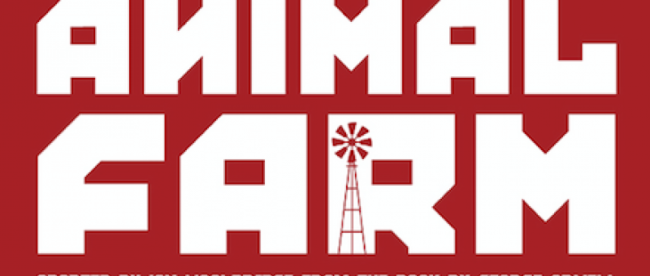Coming to the Stage: Ohlone College’s Animal Farm
Featuring an interview with Director Michael Navarra
By Katherine Lamont
With six novels, four published studies, and countless essays on the topics of fascism, imperialism, and communism, George Orwell is widely regarded as one of the greats of social literature. Published less than a month before the end of WWII, Orwell’s Animal Farm is a cleverly crafted allegory of the Russian Revolution of 1917 in which a group of farm animals, led by a few ostentatious pigs, overthrow their farmer.
In less than two days, Ohlone’s performance of the novel’s stage adaptation will begin its run, with five shows from November 12th through 20th. For some unique insight into what audiences will get to experience in the coming weeks, we interviewed the show’s director, Michael Navarra, who also works as the Director of Ohlone’s Theatre Department.
Q: Summarize the plot of Animal Farm in 5 words!
“Animals overthrow farm for equality.”
Q: What inspired you to go into directing theatre?
“I began acting when I was a kid and continued throughout high school, college, and grad school. I loved imagining another character’s worldview and pretending that I was that person. The process of collaboratively putting together stories that had a strong meaning with a group of people was exciting and challenging. I found the performances to be exhilarating, being in the moment with my fellow castmates in front of a live audience. I ended up working professionally as an actor for 20 years. Eventually, I started producing, directing, casting, and teaching. They’re all interrelated.”
Q: What about Animal Farm moved you to choose it as this year’s Fall show?
“I’m a big fan of George Orwell. He was inspired, in part, to write Animal Farm and 1984 in response to his experiences fighting in the Spanish Civil War (although Animal Farm is an allegorical fable of Soviet USSR). In Spain, Orwell fought on the side of the socialists against the fascist uprising of Francisco Franco. Franco was still in power when I was born in Spain, and I grew up learning a lot about the Spanish Civil War and its repercussions. In the years leading up to the war, Spain had become a society that was increasingly polarized, much like ours is today. Some of the rhetoric that I’ve heard in recent years echoes what I heard regarding the rhetoric pre-Spanish Civil War. It’s very easy to see when the other side has gone too far. Each side then demonizes the other as society splinters and quickly drifts apart. What I admire about Orwell is that he was able to look at the pitfalls of both sides, which included his own. This is hard for most people to do, so they wake up one day wondering how things got so far. Animal Farm is a warning that this has happened before and, if we’re not watching closely, we may inadvertently contribute to it happening again.”
Q: From a directorial perspective, do you have a character you’ve enjoyed developing the most?
“As a director, every character is important to the story. Larger characters may have more complex character arcs, but smaller characters are vital to the development of the production and need just as much attention and detail. Some of the characters in Animal Farm are direct representations of their Russian counterparts (Napoleon is Stalin, Snowball is Trotsky, and Major is Lenin). Others are stock representations of people within societies (Boxer represents the person who buries their head in their work no matter who is in charge, Clover represents the person who believes what they’re told because everyone else seems to believe it as well, Mollie represents the person who will support whomever gives them what they want, and Squealer represents the propaganda arm of the government that twists words to manipulate the masses). There are more characters in Animal Farm, and they all help the director frame the story.”
Q: What has been your favorite part of putting this show together?
“Theatre is one of the most collaborative art forms, so for me, it’s always about working with the company members (actors, designers, and crew) and building a show that can impact audiences. The content and meaning are also important, so I try to pick material that I find inspiring. Animal Farm is definitely one of those shows.”
Q: Do you have any other thoughts you’d like to share with the audience before the show officially hits the stage?
“At the moment, our actors are masked. Not just with animal masks, but also with face masks to prevent the spread of Covid. The show is a few weeks away, so things could change, but at the moment the school requires that they perform masked. This is an incredible challenge for the actors. They are doing a wonderful job of overcoming this obstacle, but it is still very difficult to articulate, breathe, and project the voice while wearing a mask.”
And with that, we have little else to do but await the production’s opening night, a monumental step forward in our return to live theatre after almost two years of quarantine! A big thanks to Michael for agreeing to this interview! Interested in seeing the show? Purchase them through the link below!
Playing at the Smith Center Nov. 12-20: https://tix6.centerstageticketing.com/sites/ohlone6/event-details.php?e=466


Wow, great article! I hope I can see the show soon!